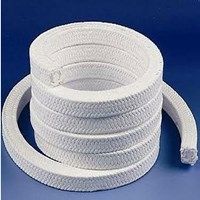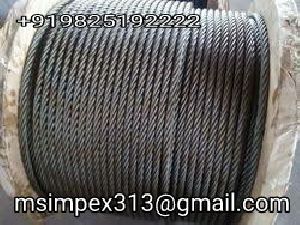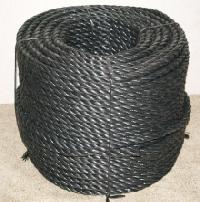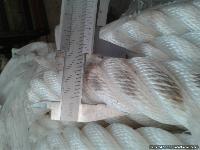
Teflon Gland Packing Rope
Get Price Quote

Plastic Rope
115 - 120 Per Kilogram
60 Kilogram (MOQ)
Plastic rope is a type of rope made from synthetic polymers, such as nylon, polyester, polypropylene, or polyethylene. It is widely used across various industries and applications due to its durability, lightweight nature, and resistance to weathering, chemicals, and abrasion. The term "plastic rope" typically refers to ropes made from plastic fibers that are manufactured for specific uses, depending on the type of plastic used and the rope’s construction. Here is a detailed description of plastic rope and its common uses: Key Features: Material Composition: Plastic ropes are made from synthetic fibers, primarily from polypropylene (PP), polyester (PET), nylon (PA), and polyethylene (PE). The specific material affects the rope's strength, flexibility, and resistance to environmental factors like UV rays, moisture, and chemicals. Durability: Plastic ropes are typically strong, durable, and resistant to wear and tear. They often have superior strength-to-weight ratios, meaning they can carry heavy loads without being bulky. Weather Resistance: Most plastic ropes are resistant to moisture, UV degradation, and abrasion, making them ideal for outdoor and marine environments where exposure to the elements is common. Lightweight: One of the key advantages of plastic rope is its relatively low weight compared to natural fiber ropes, making it easier to handle and transport. Flexibility: Plastic ropes tend to be more flexible and easier to knot compared to some other rope types, although they may not be as flexible as certain natural fiber ropes (like manila or hemp). Color Options: Plastic ropes are often available in a wide range of colors, allowing for easy identification or aesthetic purposes. Cost: Plastic ropes are generally more cost-effective than natural fiber ropes, making them an economical choice for many applications. Common Uses of Plastic Rope: Marine and Boating: Dock Lines: Plastic ropes, especially those made from nylon and polyester, are commonly used as docking lines or mooring lines for boats, yachts, and ships. These ropes are highly resistant to saltwater, UV light, and abrasion, making them ideal for marine environments. Anchoring: Plastic ropes are also used for anchoring boats, as they are lightweight yet strong enough to secure a boat in place. Safety Lines: Marine plastic ropes are used for creating safety lines on ships, ensuring crew members have a secure hold in rough waters or for working at heights. Agriculture and Horticulture: Trellises and Plant Supports: Plastic ropes, especially those made from polypropylene, are commonly used in agriculture for plant support systems, such as trellises for climbing plants like tomatoes or vines. These ropes help plants grow vertically and provide support without damaging the plants. Fencing: Plastic ropes are often used for temporary or low-cost fencing in agricultural settings, particularly for managing livestock, fencing off gardens, or marking boundaries. Irrigation Lines: Plastic ropes can be used in irrigation setups, helping to hang or support drip irrigation systems in fields, orchards, or greenhouses. Construction and Heavy Industry: Rigging and Lifting: Plastic ropes, particularly those made from nylon or polyester, are used for rigging and lifting heavy objects. Their strength and durability make them a cost-effective alternative to steel cables in some situations. Safety Nets: In construction, plastic ropes are sometimes used for creating safety nets around scaffolding or work sites to prevent workers or materials from falling. Signage: Plastic ropes are often used to hang signage or to create barriers or guides in construction zones. Outdoor Recreation: Camping: Plastic ropes are frequently used in outdoor activities like camping for setting up tents, tarps, and hammocks. Their resistance to moisture and UV degradation makes them particularly suitable for use in outdoor environments. Climbing: While not suitab
Best Deals from Rope

Polyester Rope
90 Per Kilogram
Polyester Rope Size : 2mm Colour : Bright

Steel Wire Rope
Get Price Quote

Synthetic Ropes
Get Price Quote
Synthetic Ropes, Cotton Ropes, Plastic Ropes, Polypropylene Danline Rope

Nylon Rope Plastic Rope
Get Price Quote
Offering Nylon Rope Plastic Rope. Nylon is a generic designation for a family of synthetic polymers known generically as aliphatic polyamides, first produced on February 28, 1935, by Wallace Carothers at DuPont's research facility at the DuPont Experimental Station. Nylon is one of the most commonly used polymers.[1] Key representatives are nylon-6,6, nylon-6, nylon-6,9, nylon-6,12, nylon-11, nylon-12 and nylon-4,6.[1]

Hdpe Ropes
100 - 110 Per Kilogram
250 Kilogram (MOQ)
A rope is a group of yarns, plies, fibers or strands that are twisted or braided together into a larger and stronger form. Ropes have tensile strength and so can be used for dragging and lifting. Rope is thicker and stronger than similarly constructed cord, string, and twine

Plastic Rope
Get Price Quote

Plastic Dori
Get Price Quote
Plastic Dori, Box Strap, White Sutli, rp sutli, Nylon Sutli, virgin sutli

Mono Ropes
Get Price Quote
Mono Ropes, Polypropylene Ropes

Ropes
Get Price Quote
Ropes, Monofilament Yarn, bath scrubbers, gi scrubbers

Hdpe Mono Rope
Get Price Quote
Hdpe Mono Rope, Hdpe Twine, PP Twine, HDPE Yarn